mis-
(Anglo-Saxon: bad, harsh, wrong; always a prefix)
Don't confuse this mis- unit with the following units: misce-, "mix, mingle"; miso-, mis-, "hate, hatred"; miss-, -miss, -mis- "send, throw".
1. An unfortunate event, especially something unlucky or amusing, that can happen to anyone; a mishap: Jane's misadventures began when she lost her key, and soon after missed the bus, forgot her purse on the bus, and was late for work.
2. In law, a death due to an unintentional accident without any violation of law or criminal negligence: A misadventure is an accidental decease that is not caused by a breach of the law or any illicit dereliction.
2. In law, a death due to an unintentional accident without any violation of law or criminal negligence: A misadventure is an accidental decease that is not caused by a breach of the law or any illicit dereliction.
misbegotten (adjective), more misbegotten; most misbegotten
1. From a bad source, badly thought out, or generally deplorable from start to finish: "Many are hoping that the newly-elected government will focus on ending what the people consider to be a misbegotten war."
2. Obtained by dishonest means: "The misbegotten business proposal that the investor suggested that Karl participate in was not worthy of approval."
3. Born to parents who are not married to each; or, in other words, born out of wedlock: "The baby boy that Jim Jones and Sally Smith just had was considered by their parents to be a misbegotten child."
2. Obtained by dishonest means: "The misbegotten business proposal that the investor suggested that Karl participate in was not worthy of approval."
3. Born to parents who are not married to each; or, in other words, born out of wedlock: "The baby boy that Jim Jones and Sally Smith just had was considered by their parents to be a misbegotten child."
misbehave (verb), misbehaves; misbehaved; misbehaving
1. To be naughty and troublesome, or to otherwise behave in an unacceptable way.
2. To function badly or not at all, or to cause problems.
3. To conduct one self without regard for good manners or accepted moral standards.
2. To function badly or not at all, or to cause problems.
3. To conduct one self without regard for good manners or accepted moral standards.
Unacceptable conduct, especially naughtiness, disobedience, or causing trouble that is exhibited, particularly, by children.
miscall (verb), miscalls; miscalled; miscalling
To use a wrong, or an inappropriate, name for someone or something.
1. Reckless, or malicious, behavior that causes discomfort or annoyance in others.
2. The quality, or nature, of being harmful or evil.
3. Behavior; especially, by children, that is undesirable or troublesome without being malicious; such as, a prank or a playful annoyance: "On Halloween, it is always wise to look out for mischiefs who go around playing tricks on others."
2. The quality, or nature, of being harmful or evil.
3. Behavior; especially, by children, that is undesirable or troublesome without being malicious; such as, a prank or a playful annoyance: "On Halloween, it is always wise to look out for mischiefs who go around playing tricks on others."
misclaim (verb), misclaims; misclaimed; misclaiming
To make an inappropriate demand or request for something: The inexperienced lawyer misclaimed an appeal for his client before the judge had issued a final decision; so, the joke in court was that the lawyer had "jumped the gun" in terms of making a legal demand.
A mistaken idea or view resulting from a misunderstanding of something.
1. Bad or dishonest management by people who are supposed to act on another's behalf.
2. An activity that transgresses moral or civil law; wrongdoing, wrongful conduct.
2. An activity that transgresses moral or civil law; wrongdoing, wrongful conduct.
misconduct (verb), misconducts; misconducted; misconducting
1. To behave badly, misbehave: "The children misconducted all morning".
2. To manage badly or incompetently: "The officials were miconducting the funds resulting in a decline in the company's profits."
2. To manage badly or incompetently: "The officials were miconducting the funds resulting in a decline in the company's profits."
misconstrue (verb), misconstrues; misconstrued; misconstruing
To understand, or to interpret, something incorrectly; or to mistake the meaning of something: Monroe said his words in the political speech were misconstrued by his opponents.
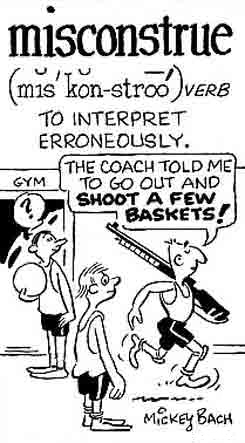
© ALL rights are reserved.
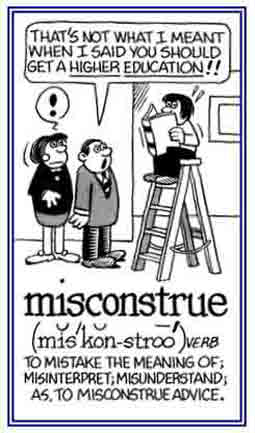
© ALL rights are reserved.
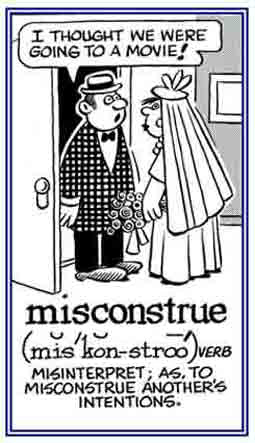
© ALL rights are reserved.
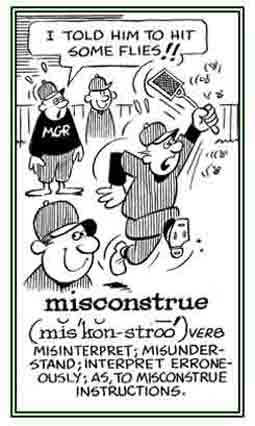
© ALL rights are reserved.
Go to this Word A Day Revisited Index
Joe, are you misconstruing what Jennifer said?




Go to this Word A Day Revisited Index
so you can see more Mickey Bach illustrations.
1. A vile wretch; a villain, a depraved rascal; or a generally malicious and contemptible person: A miscreant robbed an elderly lady after she got off the bus and was walking to her apartment.
2. A disbeliever, a heretic; an infidel: The miscreant, who yelled out that the preacher was a liar and didn't know what he was talking about, was forced out of the church service by two deacons who made sure he could not come back in.
4. Etymology: from Old French mescreant, "heretical, unbelieving, infidel"; from mes-, "wrongly"; from Latin mis-, "wrong" + creant, creire, "belief, to believe"; from Latin credere, "to believe".
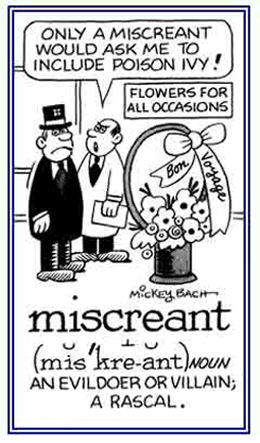
© ALL rights are reserved.
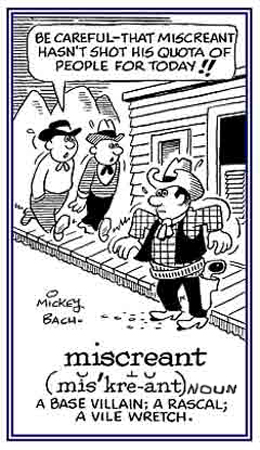
© ALL rights are reserved.
Go to this Word A Day Revisited Index
2. A disbeliever, a heretic; an infidel: The miscreant, who yelled out that the preacher was a liar and didn't know what he was talking about, was forced out of the church service by two deacons who made sure he could not come back in.
4. Etymology: from Old French mescreant, "heretical, unbelieving, infidel"; from mes-, "wrongly"; from Latin mis-, "wrong" + creant, creire, "belief, to believe"; from Latin credere, "to believe".
So, originally a miscreant was an infidel, a heretic, a pagan, or a heathen; literally, being of the “wrong belief”.


Go to this Word A Day Revisited Index
so you can see more Mickey Bach illustrations.
miscreant (adjective), more miscreant, most miscreant
Descriptive of someone who has very bad morals or who is wicked and dishonest: Adam's miscreant behavior of stealing money from the bank, while he was a teller there, resulted in his being convicted of robbery and sentenced to prison.
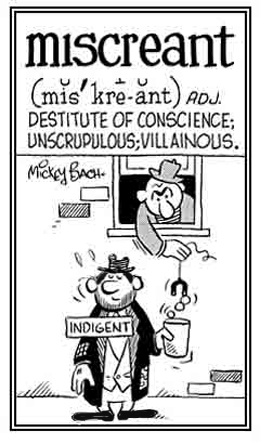
© ALL rights are reserved.
Go to this Word A Day Revisited Index

Go to this Word A Day Revisited Index
so you can see more Mickey Bach illustrations.
A wicked, blameworthy, or unlawful act.
1. A crime which is less serious than a felony and resulting in a less severe legal punishment.
2. A relatively minor misdeed.
2. A relatively minor misdeed.
Inter-related cross references, directly or indirectly, involving word units meaning "bad, wrong": caco-, kako-; dys-; mal-; pessim-; sceler-.

